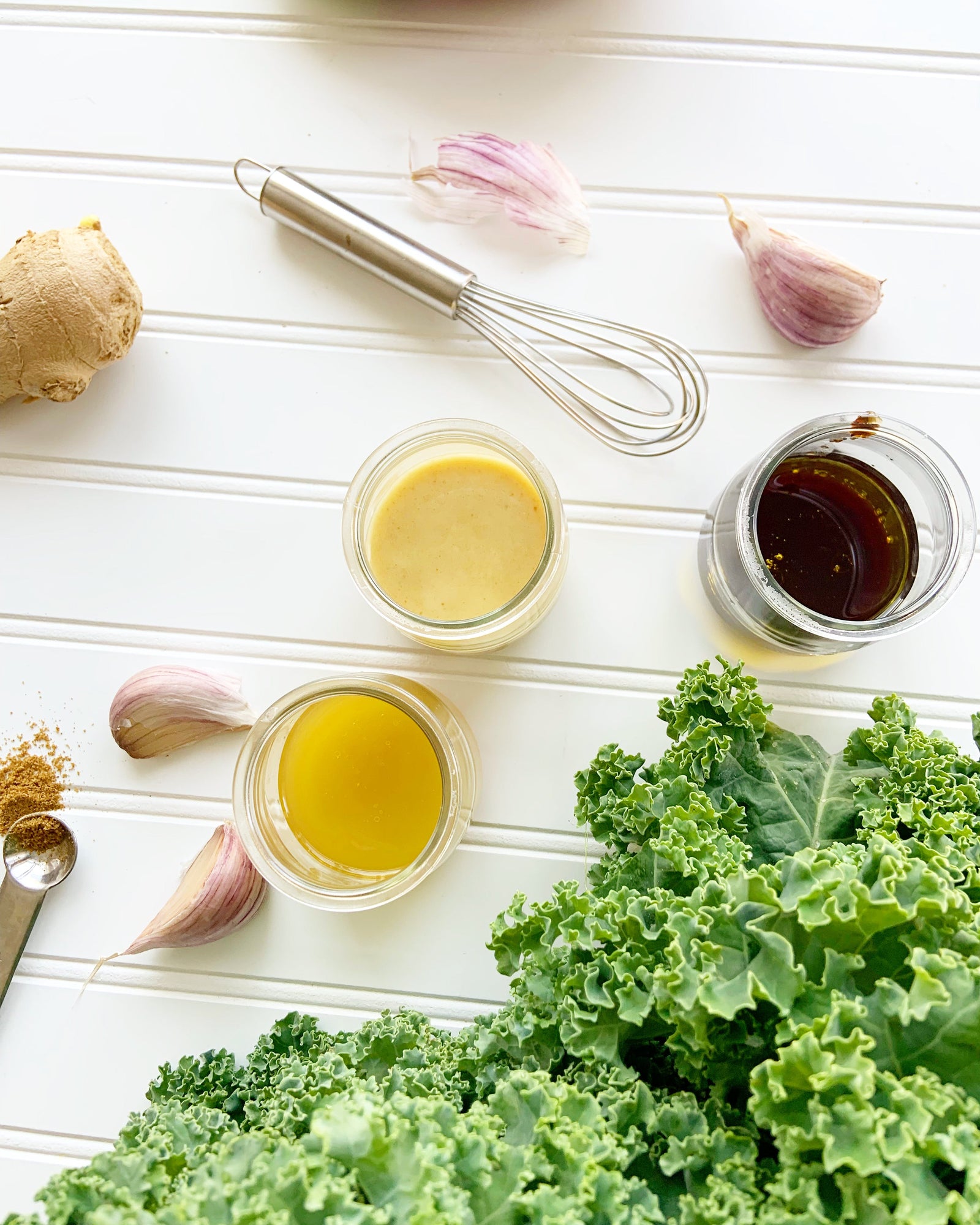Flaky, itchy, red or wrinkly skin loves these natural holistic beauty tips, which include what foods are best to eat for more healthy skin. Science knows a lot about the skin, and the key to healthy skin is about limiting inflammation. As you already know, some foods snuff the flame of inflammation, while others fuel the fire. Here's what you want to know to enjoy healthy skin naturally...
How to Get Healthy Skin Naturally
Inflammation plays a major role in how the skin looks. Sometimes, the inflammation is obvious, giving the skin a puffy, red appearance. But, the kind of inflammation you can’t see is most concerning. Chronic, low levels of inflammation, caused by inflammatory-inducing foods (sugar, dairy, packaged foods, non-plant-based fats), stress, a lack of sleep, and environmental factors (soaps, cosmetics, pollution) are wreaking havoc on the fragile pigmentation, and structures that give your skin a tight, youthful appearance.
9 Science-backed Tips and Foods for Healthy Skin Naturally
Get healthy skin naturally with the help of these science-backed holistic health tips:
- Turmeric
- Zinc
- Reduce Stress
- Sleep On
- Improve Gut Health
- Clean Cosmetics
- Sweat It Out
- Detoxify
- Eat Cranberries and Chocolate

1. Turmeric
An active component in turmeric, curcumin, has been used medically to treat a variety of dermatologic diseases, naturally promoting healthy skin. Research shows curcumin is helpful in the treatment of some inflammation-based skin problems, such as atopic dermatitis and psoriasis. This capacity to promote healthy skin is likely due to curcumin’s ability to bind, and stop pathways that activate inflammation (TNF-alpha production by macrophage, IL-2). Since inflammation is linked with aging, a process called ‘inflamm-aging’, researchers are looking into the anti-inflammatory benefits of curcumin and its potential to promote healthy skin as we age. More research is needed to determine the ideal route of administration, dosage, and duration. Curcumin is not a very easily absorbed nutrient. In the meantime, it’s always a tasty choice to fit some turmeric-rich dishes into your meal plans or cuddle up with a warm turmeric latte.
2. Zinc
This essential mineral is an anti-inflammatory, and well-known supporter of skin wound healing. Zinc plays a pivotal role in the normal function of healthy skin. Yet, are you getting enough? Since oysters aren’t a common staple at convenient stores or drive-thrus, and they are the food that contains the most zinc per serving, it’s important to look for other sources to ensure you’re getting enough. Red meat and poultry are animal-based sources of zinc. But, it’s always a good idea to reach for plant-based foods whenever possible. Chickpeas, lentils, beans, nuts, and seeds are sources of healthy skin promoting zinc. Nuts and seeds are full of nutrients, besides zinc that supports healthy skin, including omega-3s. Plus, nuts and seeds can improve blood flow – they contain the amino acid arginine which helps relax blood vessels. Healthy skin needs good blood flow.
Natural Beauty Tip: Reduce Stress
One of my favourite ways to destress on a hectic work day is to step outside, breathe deeply and nibble on some dark chocolate, like these chocolate dipped strawberries.
3. Ashwagandha
Scientists have found that stress signals from the brain tell the skin to react by activating hormones and inflammation, two factors known to be unhelpful when trying to maintain healthy skin. In particular, stress triggers the promotion of pro-inflammatory factors, and prolactin (upregulates sebum production). Sebum can build up in pores along with dead skin cells to form pimples, blackheads, or acne. You can’t avoid stress completely, but you can develop coping skills to help you limit the effects stress has on you. Time blocking is an effective means to help alleviate stress – give each part of your day a focused amount of time, including the part of the day where you do something that brings you joy. Adaptogens, such as ashwagandha may help with stress. Ashwagandha is an herb traditionally used to reduce stress and enhance wellbeing. Researchers note ashwagandha’s stress-relieving effects might be through modulation of the hypothalamus-pituitary-adrenal axis.
Natural Ways to Reduce Stress, Backed by Science
Here are some ways to reduce stress naturally, and in some cases, quickly:
-
Breathe deeply
-
Adaptogens (ashwagandha)
-
Rest/sleep
-
Step outside
-
Exercise
-
Connect with a friend
-
Human touch/hug
4. Cherries
To help lower your overall stress levels, practice deep breathing. It helps improve your mental health, emotional wellbeing, and enhances your parasympathetic responses, according to research. Calming your body, even if only for short periods of time, can help reduce cortisol levels and promote healthy skin. High cortisol levels stimulate the immune response, reduce wound healing, and may contribute to dry skin. Perhaps, more importantly, lowering your cortisol levels helps you sleep. The skin mirrors the tired, sagging feeling of fatigue that comes with insufficient sleep. Skin elasticity declines after sleep restrictions shows researchers. You need your beauty sleep! Cherries contain melatonin, a natural nutrient that appears to promote better sleep. Magnesium and some herbal teas are also helpful to promoting sleep.
Natural Beauty Tip: Heal Your Gut
The brain-skin connection also includes the gut. They all love to talk to each other. Growing evidence supports the microbes in your gut drastically influence the immune system, including how inflammation is affecting your skin. Some studies have noted probiotics can help reduce inflammation in the skin, including strains from these species: L. acidophilus, L. brevis, L. casei, L. lactis, and L. gasseri. In addition, the health of your gut microbes affects nutrient absorption and use.

5. Asparagus
Unhealthy guts can allow harmful metabolites from the gut to enter the body and negatively affect the skin. On the skin, are a variety of microbes, and the balance between helpful and harmful impacts its appearance. Microbes in your gut flourish when your diet is rich in plant-based fibres, such as those found in vegetables, such as aparagus, sweet potatoes, or artichoke, as well as other whole foods (nuts, seeds, whole grains, beans and fruits).
Natural Beauty Tip: Choose Clean Cosmetics
Avoid skincare products that contain chemicals known to irritate the skin, disrupt hormones, or pose potential harmful effects to your health. These include sodium lauryl sulphate (skin irritant), parabens (hormone disruptor), phthalates (banned from many kids’ products in the US), fragrance, butylated hydroxyanisole (a potential carcinogen). The state of California has banned 24 chemicals from personal care products. Enjoy healthy skin naturally by avoiding beauty products that contain chemicals that may harm you.
Natural Beauty Tip: Sweat It Out
When you sweat, it helps your body cool itself. Consider sweating it out, as exercise is a key part of a holistic lifestyle for healthy skin as research shows it helps hydrate the skin. And, as we all know, hydrated skin is gorgeous! The effectiveness of sweat glands as excretory organs is unclear. It likely helps in some forms of detoxification; however, it appears the kidneys and liver are far greater contributors to this important task.
6. Milk Thistle
The liver is well known to influence the appearance of your skin – consider how liver disease can cause the skin to yellow. The kidneys and liver are detoxifying powerhouses in the body, helping to eliminate harmful toxins. Toxins can enter the body in food (pesticides), water, air, or through the skin (personal care products). When toxins are not removed by the kidney or liver, they can pass to the skin, causing itchy skin, or dermatitis (inflammation of the skin). Drinking water is a great way to help your body eliminate toxins. Plus, drinking water helps hydrate the skin giving it a more radiant, plump appearance. According to the Journal of Nutrition Metabolism, a whole food approach is also a great way to support and modulate detoxification functions. As for herbs, milk thistle is a well-known natural supplement to support liver health.

7. Chocolate
Healthy skin is possible at any age. If you’re noticing age-related and photo-induced changes in your skin, you’ll be interested in researcher’s news that antioxidants, such as resveratrol , can help! Studies show resveratrol speeds up how skin repairs itself, and stimulates the production of collagen types I and II. Resveratrol is found in red grapes, peanuts, pistachios, red wine, blueberries, cranberries, and dark chocolate – talk about delicious ways to promote healthy skin, naturally.
Of course, chocolate is on the list!
Follow me on social media @deliciouslygeeky
READ BOOKS by Allison (from Amazon)
REFERENCES
Effects of turmeric (Curcuma longa) on skin health: a systematic review of the clinical evidence effects of curcuma longa on skin health. Phytother Res 2016 Aug;30(8):1243064.
Potential of curcumin in skin disorders. Nutrients 2019 Sep;11(9):2169.
Zinc therapy in dermatology: review. Dermatol Res Pract 2014; 2014: 709152.
Brain-skin connection: stress, inflammation and skin aging. Inflamm Allergy Drug Targets 2014 Jun;13(3).
Targeting the gut-skin axis – probiotics as new tools for skin disorder management? Exp Dermatol 2019 Nov;28(11):1210-1218.
Neuroimmunology of stress: skin takes center stage. J Invest Dermatol 2006 Aug; 126(8):1697-704.
Physiology of sweat gland function: the roles of sweating and sweat composition in human health. Temperature (Austin) 2019; 6(3): 211-259.
Shedding light on the effects of calorie restriction and its mimetics on skin biology. Nutrients 2020 May; 12(5): 1529.
Modulation of metabolic detoxification pathways using foods and food-derived components: a scientific review with clinical application. J Nutr Metab 2015; 2015: 760689.
An investigation into the stress-relieving and pharmacological actions of an ashwagandha (Withania somnifera) extract. A randomized, double-blind, placebo-controlled study. Medicine 2019 Sept;98(37):e17186.
How breath-control can change your life: a systematic review on psycho-physiological correlates of slow breathing. Front Hum Neurosci 2018; 12:353.
On the role of environmental humidity on cortisol production by epidermal keratinocytes. Exp Dermatol 2104 Jan; 23(1): 15-17.
A study of skin characteristics with long-term sleep restriction in Korean women in their 40s. Skin Res Technol 2020 Mar; 26(2):193-199.
Advances in the use of milk thistle (Silybum marianum). Integrative Cancer Therapies 6(2): 104-9.
Also in Blog

The Microbiome Diet: Gut Health, the Human Microbiome and Your Health
Your guide to the human microbiome, with insights into the Microbiome Diet, and whether it can improve your health, including indigestion.

Why Can't I Sleep: Your Guide to Better Sleep





